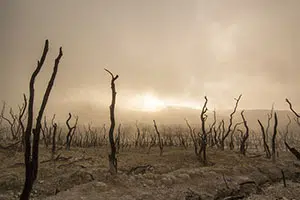 With etymological origin in the Latin word desolatio , desolation is the act and result of becoming desolate or desolate . This verb (desolate), meanwhile, refers to destroying or causing sadness or anguish .
With etymological origin in the Latin word desolatio , desolation is the act and result of becoming desolate or desolate . This verb (desolate), meanwhile, refers to destroying or causing sadness or anguish .
It can be said that desolation appears with something destroyed or ruined . Suppose that, in a certain territory, a bloody civil war develops. The bombings cause the collapse of numerous buildings and leave public spaces in ruins . Faced with this panorama, many people lament the desolation of the region in question.
Take the case of a government that does not invest in the maintenance of a park . The monuments in the area look deteriorated, with graffiti and damage to the paint. The vegetation, on the other hand, was lost over time. Furthermore, it is common for criminals to gather there. Due to all these issues, the park is desolate.
Sometimes, desolation is associated with the lack of life . When the presence of human beings is not noticed and the environment is very arid, without plants, it is common for the desolation of the site to be mentioned.
Now let's imagine a little-traveled road that crosses a desert . It is common for motorists to travel hundreds of kilometers without encountering other drivers, since it is a rarely used road. Likewise, the landscape is not attractive: there are no crops or flowers. Those who must advance along this road usually refer to the desolation of the road , which even generates distress or anxiety .
It is important to note that this term is not used very often in everyday speech. However, it does not belong to that group of words that only appear in the field of literature: it is a special case, which sometimes provides extra emphasis in popular language, and that is why it has its place reserved in informal conversations. .
This is not exclusive to very technical or specific words, since it is also recorded with phrases with a very exaggerated tone, such as "I'm dying of hunger!" to express that we are very hungry and that we cannot wait for the food to arrive, for example.
 If we arrive at a sea beach where there seems to be no life, we can say many different things to express our astonishment. Without adding any nuance of humor or personal opinion, just "There doesn't seem to be anyone else" is enough. However, if we want to emphasize our surprise and elicit a response from others, such as laughter, there are always these words or phrases that apparently would not be used in these contexts; for example: "My God, how desolate!" .
If we arrive at a sea beach where there seems to be no life, we can say many different things to express our astonishment. Without adding any nuance of humor or personal opinion, just "There doesn't seem to be anyone else" is enough. However, if we want to emphasize our surprise and elicit a response from others, such as laughter, there are always these words or phrases that apparently would not be used in these contexts; for example: "My God, how desolate!" .
Let's see below some of the most common synonyms for the word desolation : anguish, affliction , pain, sadness, regret and helplessness . In this case, two antonyms that we can mention are joy and happiness . On the other hand, in the first paragraphs examples are presented that correspond more with the following synonyms: ruin, devastation and desolation .
We can notice that the second list of synonyms seems to express certain aspects of a site that are more objective than subjective, although they are not found at a single extreme either. If we feel devastated because we have suffered a very deep damage , impossible to put into words or overcome, such as the death of a loved one, it goes without saying that objectivity has no place in this very personal situation. On the other hand, using the word desolation to describe a road that seems to have been abandoned is closer to an objective observation, since the absence of people and the lack of maintenance can be undeniable in the eyes of anyone.
«Desolación» , finally, is a work by the Chilean writer Gabriela Mistral . This book was first published in 1922 .
